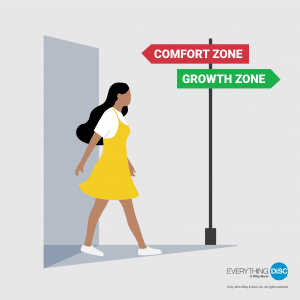Knowing one’s own DiSC® style, or that of another, can help you be aware of what situations might cause you stress and how you might respond. While this article was originally written in response to the COVID-19 restrictions, it has been updated and can apply to stresses caused by many major changes in life.
You might appreciate how the C styles are able to focus on the big picture during crisis and make logical choices. Or you might notice them becoming more rigid and out of touch with others. They react to stress by overusing restraint and by relying on data and analysis to an even greater degree.
What might be stressing to the C style?
- Not having all the desired facts to make decisions
- Emotions displayed in response to political unrest, economic instability, mass shootings, or other news
- Not knowing how best to respond to the needs of their loved ones
- Anticipating more social and in-person events
- Trying to show empathy via technology
- Making well-considered plans and then having to change them
- Not being able to meet their high standards
- Working under time pressure
- Being unprepared
- Not knowing when or how their organization will respond to changes enabled by coronavirus vaccinations
- Anything that challenges their core belief: “I’m valuable if I’m competent”

What does the C style need during times of stress?
Competence: knowing that they can do their jobs well and maintain credibility
Understanding: knowing the implications of the change(s) and maintaining their expertise
Stability: having a sense of predictability and freedom from chaos
Tips for the C style
- Take the time to examine whether your goals and expectations are reasonable and attainable right now. You can adjust them.
- Consider that there might not be an optimal answer or best choice. If you make a poor choice, that might be data for your next one.
- Develop, practice, and upgrade your skills in empathy. Empathize so you can understand and test assumptions. Don’t rush empathy, and don’t try to empathize before you truly understand the situation. Take an extra five minutes to listen and ask questions before trying to connect with the other person.
- Contribute more than criticize. It’s often easier for the C style to spot problems and find faults than to bring people together to fix them.
- Don’t put off difficult conversions. Putting them off won’t make them easier. Do prepare the other person. Just find a time when they don’t have their kid in the room or are walking their dog, for example.
- Look beyond the data. Look to the people side of things. How are your actions affecting others? Try not to be too stubborn. Stay open to alternatives.
- Avoid isolating yourself. This may involve practicing being vulnerable. Vulnerability and the courage to be open to another person are the keys to real human connection.
- Know that you’re not alone if you’re nervous about seeing more people. Nearly half of respondents (49%) to the American Psychological Association’s latest Stress in America™ poll said they feel uneasy about adjusting to in-person interaction once the pandemic ends.
- You don’t have to do it all. Build up your delegation skills.
- We’re all finding new ways of celebrating and you might need time to imagine what those will be like, how you can join in, and how you want to contribute. It’s never a bad time to thank someone or let them know how much you appreciate their contributions.
- Establish routines based on what you value. For example, if you value learning, take a regularly scheduled online course. If you value a relationship, schedule regular contact with that person. If you really enjoy teaching, offer to demonstrate how to use an online platform, play a new game, or develop a skill.
- Try on the receptive mindset typical of the S style. Stay open to others’ ideas and be willing to compromise.
Tips for every style
- Get enough sleep.
- Exercise as appropriate.
- Get outside. If you can’t get outside, look at images of outdoor beauty.
- Stay connected and social in safe ways.
- Practice self-compassion.
- Stay (or become) grateful. Studies have shown that those who practice gratitude are more optimistic and have better relationships.
- Look for opportunities to laugh. We suggest viewing 9 Funny Data “Fails” or reading The Internet shares funny ‘Work From Home’ fails.
- Recognize that anxious thoughts, sadness, and all sorts of emotions will come up every day and they are normal. Acknowledge them, look at them with curiosity, and practice letting them go. Avoiding them will make them stronger.
- Take action by performing random acts of kindness for others.
- Ask for help if you need it. Now might be the time to reach out to a friend, a life coach, a therapist, or a help line. When we don’t ask for help or speak up about a problem, we’re likely to make poor decisions or our organization’s bottom line can take a hit.
- Learn more about yourself with Everything DiSC Workplace or build your emotional intelligence with Everything DiSC Agile EQ.
I’d like to end this with these words from Brené Brown, in her book Rising Strong:
“We will all struggle and fall; we will all know what it means to be both brave and broken hearted.”

